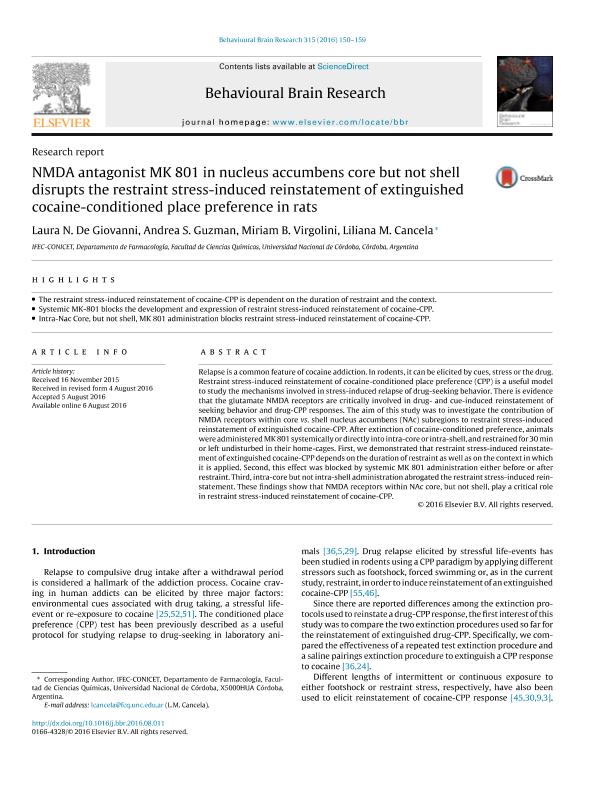Artículo
NMDA antagonist MK 801 in nucleus accumbens core but not shell disrupts the restraint stress-induced reinstatement of extinguished cocaine-conditioned place preference in rats
de Giovanni, Laura Noemi ; Guzman, Andrea Susana
; Guzman, Andrea Susana ; Virgolini, Miriam Beatriz
; Virgolini, Miriam Beatriz ; Cancela, Liliana Marina
; Cancela, Liliana Marina
 ; Guzman, Andrea Susana
; Guzman, Andrea Susana ; Virgolini, Miriam Beatriz
; Virgolini, Miriam Beatriz ; Cancela, Liliana Marina
; Cancela, Liliana Marina
Fecha de publicación:
12/2016
Editorial:
Elsevier Science
Revista:
Behavioural Brain Research
ISSN:
0166-4328
Idioma:
Inglés
Tipo de recurso:
Artículo publicado
Clasificación temática:
Resumen
Relapse is a common feature of cocaine addiction. In rodents, it can be elicited by cues, stress or the drug. Restraint stress-induced reinstatement of cocaine-conditioned place preference (CPP) is a useful model to study the mechanisms involved in stress-induced relapse of drug-seeking behavior. There is evidence that the glutamate NMDA receptors are critically involved in drug- and cue-induced reinstatement of seeking behavior and drug-CPP responses. The aim of this study was to investigate the contribution of NMDA receptors within core vs. shell nucleus accumbens (NAc) subregions to restraint stress-induced reinstatement of extinguished cocaine-CPP. After extinction of cocaine-conditioned preference, animals were administered MK 801 systemically or directly into intra-core or intra-shell, and restrained for 30 min or left undisturbed in their home-cages. First, we demonstrated that restraint stress-induced reinstatement of extinguished cocaine-CPP depends on the duration of restraint as well as on the context in which it is applied. Second, this effect was blocked by systemic MK 801 administration either before or after restraint. Third, intra-core but not intra-shell administration abrogated the restraint stress-induced reinstatement. These findings show that NMDA receptors within NAc core, but not shell, play a critical role in restraint stress-induced reinstatement of cocaine-CPP.
Archivos asociados
Licencia
Identificadores
Colecciones
Articulos(IFEC)
Articulos de INST. DE FARMACOLOGIA EXPERIMENTAL DE CORDOBA
Articulos de INST. DE FARMACOLOGIA EXPERIMENTAL DE CORDOBA
Citación
de Giovanni, Laura Noemi; Guzman, Andrea Susana; Virgolini, Miriam Beatriz; Cancela, Liliana Marina; NMDA antagonist MK 801 in nucleus accumbens core but not shell disrupts the restraint stress-induced reinstatement of extinguished cocaine-conditioned place preference in rats; Elsevier Science; Behavioural Brain Research; 315; 12-2016; 150-159
Compartir
Altmétricas



